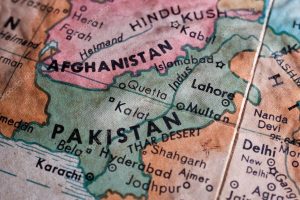The Tehreek-e-Taliban Pakistan, also known as the TTP or simply the Pakistani Taliban, has wreaked havoc since the takeover of Afghanistan by the Afghan Taliban.
Following years of attacks that killed thousands of Pakistani civilians and service members, the TTP was driven out of Pakistan by the Zarb-e-Azb military offensive in 2014. For a time, the group was mostly quelled. But the TTP has seen a major resurgence since its main benefactor, the Afghan Taliban, once again took the helm in Kabul.
Voice of America reports that “violence claimed by or blamed on the TTP and other militant groups killed almost 1,000 Pakistanis, including nearly 300 security forces, in some 376 terrorist attacks in 2022.” This represents an approximately 50 percent increase since the Taliban came to power in Afghanistan.
The TTP and the Afghan Taliban’s shared history and overlapping ideology make them an especially dangerous combination for South and Central Asia as well as the international community. Furthermore, the TTP embodies a fast-growing militant ecosystem in the region where other transnational organizations with a historic focus on Western targets, such as al-Qaeda in the Indian Subcontinent (AQIS) and Islamic State Khorasan Province (ISKP), can continue building operational capacity.
Consequently, the United States must pay attention to the TTP and the militant resurgence it represents for three key reasons.
The TTP Represents a Rejuvenated Militant Ecosystem
With huge historic operational capability, strong political capital, the backing of a neighboring de-facto regime armed with more than $7 billion worth of U.S. military equipment, and a host country suffering multiple intersecting crises, the TTP has a window of opportunity to destabilize Pakistan — and by extension, the entire region — that it never had before.
Though it may be mainly Pakistan paying the price right now, that the TTP is being allowed to flourish in Afghanistan means that the Afghan Taliban is, in fact, comfortable with transnational militant groups basing their operations in Afghanistan. That constitutes a violation of the 2020 Doha agreement in which, rather questionably, the United States and the Afghan Taliban agreed that the latter would not allow Afghanistan to serve as a launch pad for such activity. One can reasonably infer that Washington has not taken notice simply because these destabilizing elements have not directly impacted the West.
To assume that this will be the case in perpetuity, however, is running on blind faith. In the end, whether hosting the TTP reflects intentional Afghan Taliban support, an inability to secure the country, or some combination of the two, the outcome is the same: Today it’s the TTP targeting Pakistan, but tomorrow it could be AQIS or ISKP planning coordinated attacks based out of Afghanistan and Pakistan with their global affiliates in other regions, including the West.
Perceived U.S. Disengagement With Pakistan Has Not Gone Unnoticed
The TTP and other organizations see that the tangible and rhetorical umbrella provided to Pakistan by the United States in the past has significantly diminished, reflecting the frosty state of Pakistan-U.S. relations in recent years. Although one can infer that this is part of the reason Islamabad is so hesitant to push the TTP (instead accommodating the group through multiple rounds of failed negotiations), it also indicates that a peaceful resolution is unlikely. Yet more concerningly, the consequence of these failed negotiations is a TTP with stronger footing and capacity on Pakistani soil combined with the “clout” of having out-negotiated the government.
In this context, if Islamabad is to resume direct military action against the TTP and send a signal to the Afghan Taliban (as well as ISKP and AQIS) that there are formidable forces up against them, the support of the international community would benefit these efforts and help to promote a secure, stable region, a common interest among all parties.
This provides a window of opportunity: Washington and Islamabad have both signaled an interest in reconciling following years of deteriorating relations. Supporting Pakistan’s government in the fight against militancy not only pushes back on recently expanded footing found by the TTP and its peers, but it also provides an opening for broader rapprochement in this longstanding but troubled bilateral relationship.
A Destabilized Pakistan Will Negatively Impact Regional and International Security
The TTP is a direct threat to regional stability. Given the Afghan Taliban’s clear willingness to host transnational terrorist groups, the reality is that Afghanistan will likely become an epicenter of militancy with the capability of destabilizing Pakistan and, by extension, its neighborhood. Militant attacks have nearly sent nuclear-armed India and Pakistan to war on numerous occasions, including in 2008 and 2019. The TTP is arguably even more potent than Lashkar-e-Taiba and Jaish-e-Mohammad, though, and as a result other transnational militant groups such as ISKP and AQIS will look to this example, as well as to the Pakistani government’s ceding of space to extreme elements, and take inspiration.
And this is hardly the only crisis Pakistan faces. A dire economic situation, catastrophic floods last year which put one-third of the country under water and devastated millions of livelihoods, collapsing foreign exchange reserves, skyrocketing inflation, and myriad other challenges constitute an incredibly fragile country context, which, as Uzair Younus puts it, is “at odds with itself, and adrift globally.”
The circumstances are dangerously ripe for a destabilizing element to shift the strategic balance in South Asia. The international community cannot ignore the warning signs any longer.

































